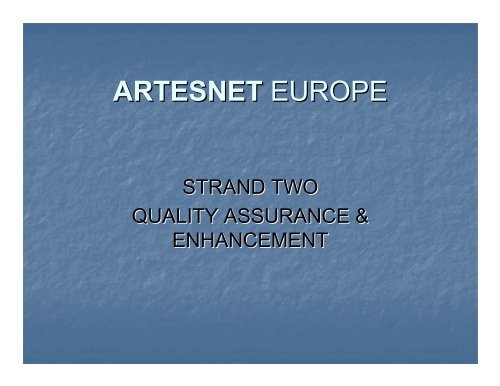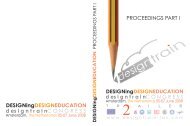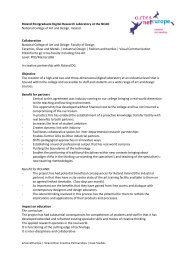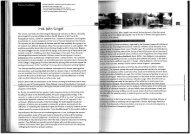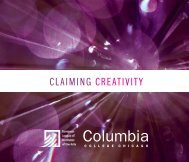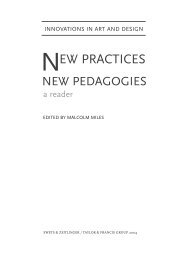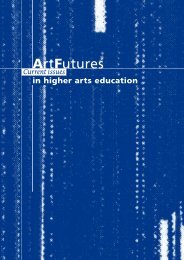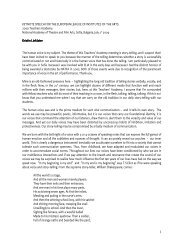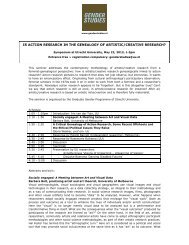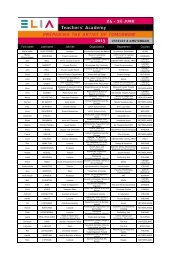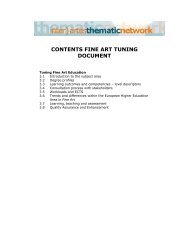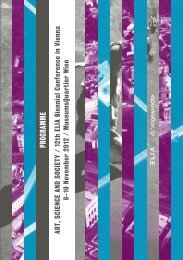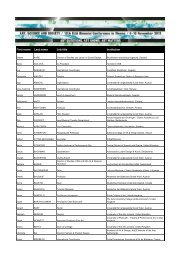ARTESNET EUROPE - Elia
ARTESNET EUROPE - Elia
ARTESNET EUROPE - Elia
Create successful ePaper yourself
Turn your PDF publications into a flip-book with our unique Google optimized e-Paper software.
<strong>ARTESNET</strong> <strong>EUROPE</strong><br />
STRAND TWO<br />
QUALITY ASSURANCE &<br />
ENHANCEMENT
Overarching Objectives OF <strong>ARTESNET</strong> <strong>EUROPE</strong><br />
<br />
<br />
To support all arts institutions in Europe (including students,<br />
management, teaching, technical and administrative staff) to<br />
gain expertise on self-evaluation evaluation as an institutional<br />
responsibility, linking internal quality issues with external<br />
requirements with a special focus on institutions in the new<br />
member states and candidate countries.<br />
To consolidate and further develop a shared body of<br />
knowledge within the European higher arts education<br />
community on quality issues, that could lead to an<br />
independent European quality assurance network as a<br />
voluntary partnership for higher arts education.
To contribute to the ongoing process of convergence and<br />
transparency in higher arts education by establishing<br />
European reference points for the first, second and third<br />
cycles, and for recruitment, learning, teaching and<br />
assessment.<br />
To capitalise on, and to transfer good practice by linking<br />
higher arts education institutes with local and regional<br />
communities, professional practice, and cultural and<br />
professional organisations.<br />
To value and preserve cultural, artistic, and pedagogical<br />
diversity.<br />
To ensure a co-ordinated, ordinated, bottom-up approach to all<br />
implications of the Bologna process for the arts.
SPECIFIC OBJECTIVES & FOCUS<br />
<br />
<br />
<br />
To support institutions to better understand self-evaluation evaluation as<br />
an effective way to assess internal quality and how self-<br />
evaluation relates to external standards and procedures.<br />
To address subject-based based as well as institutional review,<br />
looking at self-evaluation evaluation as an institutional responsibility to<br />
enhance the quality in art schools, rather than focusing on the<br />
bureaucratic and controlling aspects of quality assurance.<br />
To develop an independent institutional evaluation<br />
programme linked to a European accreditation network for<br />
higher arts education (sustainability strategy).
GENERAL PRINCIPLES<br />
<br />
<br />
<br />
<br />
<br />
<br />
<br />
<br />
move to student-centred, outcomes based learning.<br />
involves student participation.<br />
based on a set of common and shared principles underpinning<br />
quality assurance irrespective of differing national approaches.<br />
based on peer review.<br />
involves participation of professional bodies.<br />
emphasis on the development and use of transparent explicit<br />
criteria and processes.<br />
process is open to external scrutiny.<br />
national quality assurance agencies are established.
transparency of procedures through the inclusion of a<br />
range of external and international reference points.<br />
need for ‘comparability’ – European framework.<br />
emphasis on enhancement of quality.<br />
has formal status and outcomes are publicly available.<br />
increased emphasis on the stakeholders (student and<br />
employer) in programme planning.<br />
greater transparency about qualifications and standards<br />
– European framework providing reference points to<br />
establish comparability.
Working method<br />
<br />
<br />
<br />
To establish and train a panel of experts in European Quality<br />
Assurance & Enhancement in higher arts education – two x 3<br />
day sessions in Birmingham training 18 experts (critical<br />
friends).<br />
To pilot 5 x Institutional Review visits: University of Art &<br />
Design Cluj-Napoca, Rumania; National Academy Theatre,<br />
Film & Television Sofia, Bulgaria; Lithuania Academy of<br />
Theatre & Film, Vilnius, Lithuania; University of Technology<br />
Brno, Czech Republic and Akdeniz University, Antalya,<br />
Turkey.<br />
To carry out 5 x Regional Workshops: Budapest, Hungary;<br />
Athens, Greece; Stuttgart, Germany; Porto, Portugal and<br />
Ankara, Turkey – to disseminate the outcomes and share<br />
experiences.
Preliminary visit<br />
Principle objectives are:<br />
• to gain a clearer understanding of the specific national,<br />
regional and local contexts impacting on the institution<br />
(autonomy)<br />
• to gain a clearer understanding of the existing management<br />
operations of the institution<br />
• to discuss the self evaluation process and the institution’s<br />
SER<br />
• to gain greater understanding of the institution’s s QME<br />
processes<br />
• to identify and request any missing information from the SER<br />
Main visit<br />
The ET’s s main objective is to arrive at a well substantiated view of the<br />
strategic management of quality management and enhancement in<br />
the institution at both institutional and subject discipline level.<br />
el.<br />
Where the preliminary visit focus was on understanding what is<br />
specific about that institution, the main visit is about finding out<br />
whether, how and with what results the institution’s s strategic and<br />
internal quality policies and procedures are implemented throughout<br />
out<br />
all levels of the institution.
Impact on the higher arts education community in<br />
Europe<br />
<br />
<br />
<br />
<br />
An increasingly shared understanding of the value and meaning of<br />
the three cycles in higher arts education in Europe and their<br />
relevance to cultural, social and economical development.<br />
The development of a common understanding of terminology.<br />
Informative profiles describing core learning outcomes/competences<br />
for the three cycles in arts disciplines, agreed in interaction with the<br />
professional field.<br />
Shared visions and insights on recruitment, learning, teaching and a<br />
assessment developed in arts disciplines.
All higher arts education institutes, including new member<br />
states and the candidate countries are able to realise self-<br />
evaluation as an institutional responsibility.<br />
Students have become central to the process and key<br />
contributors in the development of the European higher arts<br />
education sector.<br />
The quality of an external evaluation is directly dependent on<br />
the preparation and implementation of a continuous rigorous<br />
internal evaluation process and the institution’s s willingness for<br />
open, honest critical self-evaluation.<br />
evaluation.<br />
The institution has to work to promote a fuller understanding<br />
of learning outcomes as a means of both shaping and<br />
assessing the student learning experience, ensuring that an<br />
appropriate value is placed on the process of student<br />
learning.
The higher arts education community at large feels informed about<br />
relevant Bologna developments and fears about European<br />
standardisation and uniformity have substantially diminished.<br />
The enhancement of respect and good reputation among other<br />
faculties/departments of the institution, and the creation of the<br />
potential for stronger integration within the institution.<br />
A more thorough focus on the graduate profile, the inter-connection<br />
of the learning process and practical professional activities, and a<br />
collaboration with employers and professional organisations.<br />
National QA Agencies have been established and operating<br />
international review panels for institutional review and accreditation<br />
(e.g. Sweden & Lithuania) – experts have been invited to participate<br />
and chair panels.<br />
There remains a significant divergence in national approaches to the<br />
third cycle PhD research in the Arts – retention of scientific<br />
methodologies in many countries; no PhDs/Professors in Technical<br />
Universities.
External Stakeholders<br />
Employers<br />
Student Destination<br />
& Achievement<br />
Galleries<br />
Educational Institutions<br />
Internal Stakeholders<br />
Students<br />
Academic Staff<br />
Administrative Staff<br />
Ancillary Staff<br />
External/Institutional<br />
Stakeholders<br />
External Examiners<br />
Consultants<br />
National Agencies
ROLE OF THE EVALUATION TEAM (ET)<br />
We see the role of the team as a critical friend:<br />
• to analyse the institution’s s existing and intended quality management<br />
and enhancement capacity and procedures<br />
• to make recommendations to the institution on how to improve<br />
quality management and enhancement (QME) capacity and<br />
procedures<br />
• to identify good practice<br />
To carry out these tasks the ET will act as:<br />
• representatives – to reflect current good practices in quality<br />
management and enhancement<br />
• evaluators – to analyse the institutions existing management and<br />
enhancement practices<br />
• advisors – to make recommendations to develop these practices<br />
All team members share equal responsibility for and contribute fully f<br />
to the process. Each will make notes, chair meetings, discuss<br />
findings and contribute to the final report.
INSTITUTIONAL QA&E REVIEW<br />
Evaluation teams (ET) focus on the following evidence:<br />
<br />
<br />
<br />
<br />
<br />
<br />
<br />
<br />
<br />
Internal QA reviews and their outcomes<br />
Review/validation of programmes<br />
Use of external reference points in course construction<br />
Internal systems for the management of information<br />
Development and use of programme specifications<br />
Academic standards expected from students<br />
Progression, retention and achievement data<br />
The experience of students as learners<br />
Management of teaching staff – appointments, appraisal<br />
etc
EVIDENCE COLLECTED<br />
<br />
<br />
<br />
<br />
<br />
Self evaluation reports (SER’s)<br />
Information presented by and gathered from<br />
students.<br />
Student achievement, progression, etc.<br />
Recent review reports<br />
Information acquired during the visit
STUDENTS<br />
Students are central to the process of review<br />
The audit will examine:<br />
<br />
Information available to students<br />
<br />
How learning is facilitated<br />
<br />
Academic standards they are expected to achieve, and<br />
achieve in practice
INSTITUTIONAL<br />
SELF EVALUATION REPORT (SER)<br />
The self evaluation report is intended to<br />
address four questions:<br />
<br />
<br />
<br />
<br />
What is the institution trying to do?<br />
How is the institution trying to do it?<br />
How does the institution know if it works?<br />
How does the institution change in order to<br />
improve?
Institutional SER Content<br />
What is the institution trying to do?<br />
<br />
<br />
<br />
<br />
<br />
<br />
<br />
Mission statement - broad institutional philosophy/aims<br />
Distinctive features - what it is recognised for<br />
Governance, organisation and management<br />
Learning, teaching and assessment<br />
Research and scholarship<br />
Relationship to external agencies, professional bodies,<br />
industry and society<br />
Major developments, changes over last 4 years
Institutional SER Content<br />
How is the institution trying to do it?<br />
Analysis of strengths and areas for improvement<br />
<br />
<br />
<br />
Academic activities<br />
- research and educational approaches<br />
- education programme design and organisation<br />
- evaluation of how these programmes reflect institutional<br />
mission<br />
Academically related activities<br />
- analysis of external links, regional and community service<br />
- analysis of student support services<br />
- evaluation how these programmes reflect the mission<br />
Management and administrative systems and activities<br />
- communication
Institutional SER Content<br />
How does the institution know that it works?<br />
<br />
Institution quality monitoring processes for:<br />
- appointment of staff<br />
- creating new courses<br />
- external examiners<br />
- learning support services<br />
- learning, teaching and assessment<br />
- research<br />
- review and approval of existing courses<br />
- staff development<br />
- student involvement and feedback in quality assurance<br />
process<br />
- student progression, retention and achievement<br />
- student support and guidance.
Institutional SER Content (cont)<br />
How does the institution know it works?<br />
<br />
<br />
Framework for management of quality and academic standards<br />
- policy<br />
- key features<br />
- aims<br />
- key documents<br />
Committee and management structures<br />
- overview and structure<br />
- institution<br />
- department/faculty<br />
- management responsibilities<br />
Feedback by key stakeholders: students, graduates, employers s and<br />
professional bodies
Institutional SER Content<br />
How does the institution change in order to improve?<br />
Strategic management and capacity for change<br />
Analysis of the role of quality management to implement and<br />
support change<br />
<br />
<br />
<br />
<br />
Identify and respond to internal and external demand<br />
and opportunities<br />
How are internal and external representatives involved<br />
in strategic management?<br />
What role does quality monitoring and management<br />
play in these developments?<br />
What changes do you envisage due to these<br />
influences?
DISCIPLINE REVIEW (DR)<br />
<br />
To verify that the institutions QA mechanisms are<br />
working at course/programme level<br />
<br />
A window to view student achievement and effectiveness<br />
of support for learning<br />
<br />
A means to check claims made by the institution
Comprises five elements:<br />
DISCIPLINE REVIEW<br />
<br />
<br />
<br />
<br />
<br />
Short self evaluation report<br />
Discussion between team and staff and students about how<br />
QA policies are implemented<br />
Scrutiny of the accuracy of information (prospectus,<br />
website, programme specifications, etc)<br />
Observation of the relation between programmes and<br />
intended learning outcomes (sample of assessed work,<br />
progression, achievement, external examiners reports etc)<br />
The QA team can request additional information
DISCIPLINE SELF EVALUATION REPORT<br />
The report is an objective, critical self-evaluation evaluation of the<br />
course/programme by the course/programme team including<br />
programme specification and addressing the following:<br />
<br />
<br />
<br />
<br />
<br />
<br />
<br />
<br />
<br />
Maximum 3,000 words<br />
Educational philosophy and aims of the provision<br />
Description of the learning outcomes<br />
Curricula and assessment<br />
Quality of learning opportunities<br />
Learning and teaching policy and strategy<br />
Student admission and progression (including<br />
statistics)<br />
Learning resources<br />
Process for maintenance and enhancement of<br />
standards and quality
EVALUATION REPORT<br />
Relies on the accuracy, integrity, completeness and frankness<br />
of the information provided by the institution and offers:<br />
<br />
Recommendations<br />
<br />
and highlights Good Practice


